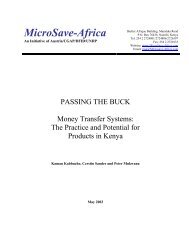Create successful ePaper yourself
Turn your PDF publications into a flip-book with our unique Google optimized e-Paper software.
Don Mickelwait went<br />
back to Harvard for<br />
more training and<br />
returned with a new<br />
marketing enthusiasm<br />
for bringing in<br />
business. It paid <strong>of</strong>f.<br />
30<br />
restructuring was intended to provide more<br />
autonomy to staff and create a more responsive<br />
organization. Most importantly, it was intended<br />
to enable the company to grow. But the question<br />
remained <strong>of</strong> where new growth and pr<strong>of</strong>itability<br />
would come from. By the end <strong>of</strong> 1986,<br />
<strong>DAI</strong>’s revenues reached $8 million, but it was<br />
only a break-even year.<br />
Despite the restructuring, legacy practices and<br />
procedures stood in the way <strong>of</strong> growth in the<br />
mid-1980s. Proposal writing, for example, remained<br />
all art and no science in the early 1980s.<br />
As Peter Reiss recalled, “Somebody got an RFP,<br />
took it into an <strong>of</strong>fice, closed the door, and basically<br />
they said, ‘Come out when you’ve finished<br />
it.’” Clearly, <strong>DAI</strong> needed some schooling, so<br />
Mickelwait enrolled in a part-time executive<br />
training program at Harvard Business School.<br />
He returned from the first sessions “charged<br />
up,” and urged his colleagues to become<br />
much more aggressive about sending people<br />
out on “recon” to secure advance information<br />
for upcoming proposals and line up potential<br />
team members. Mickelwait himself frequently<br />
walked the halls <strong>of</strong> the USAID/Indonesia mission,<br />
popping into <strong>of</strong>fices, asking questions,<br />
and, whenever he could, reading any competitor’s<br />
proposal that might be lying around. Word<br />
traveled fast. “They used to send messages out<br />
saying, ‘Mickelwait’s coming, lock your door,’”<br />
he admitted. His enthusiasm sometimes drew<br />
similar responses at <strong>DAI</strong>. When Mickelwait<br />
returned from marketing trips with big ideas,<br />
staffers warned <strong>of</strong> “another solar flare” liable to<br />
shake up the company. Barclay did his best to<br />
moderate the ups and downs <strong>of</strong> the mercurial<br />
leader.<br />
The new energy and market focus would soon<br />
start to pay dividends. <strong>DAI</strong> was a different<br />
company from the one that had gambled with<br />
its balance sheet at the Homestead. Mickelwait<br />
set a conservative tone by mandating a potluck,<br />
bring-your-own-bottle <strong>of</strong>fice holiday party<br />
in December 1986. But he and Barclay, with<br />
the Board’s approval, were determined to move<br />
ahead. If consistent pr<strong>of</strong>itability was still elusive,<br />
<strong>DAI</strong>’s founder had learned two very important<br />
things. The first was that with USAID decentralizing<br />
much <strong>of</strong> its decision making to overseas<br />
missions, there was “a multitude <strong>of</strong> contracting<br />
windows” with more new bidding opportunities<br />
than <strong>DAI</strong> had previously recognized. The



